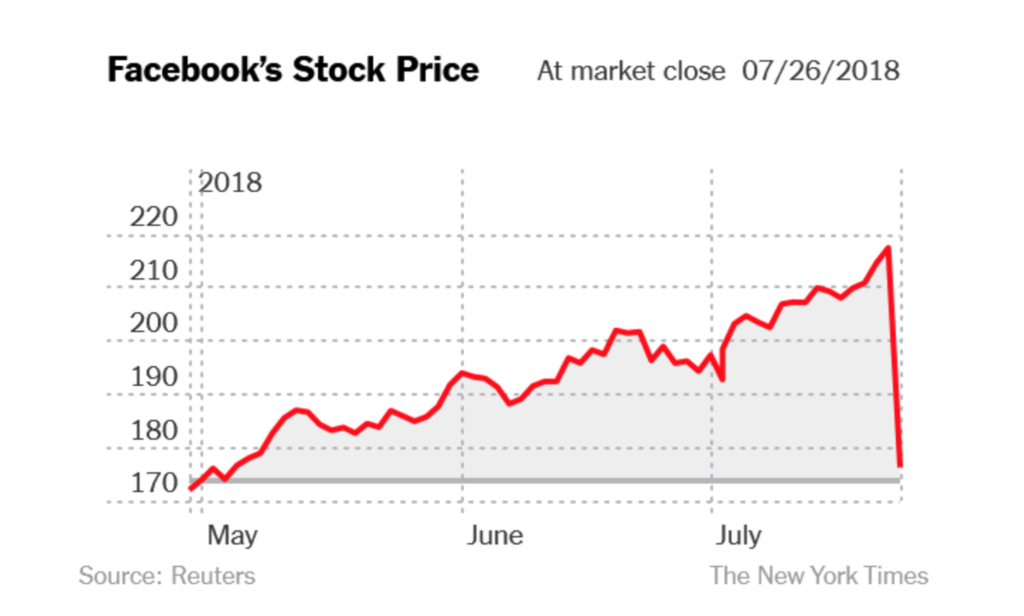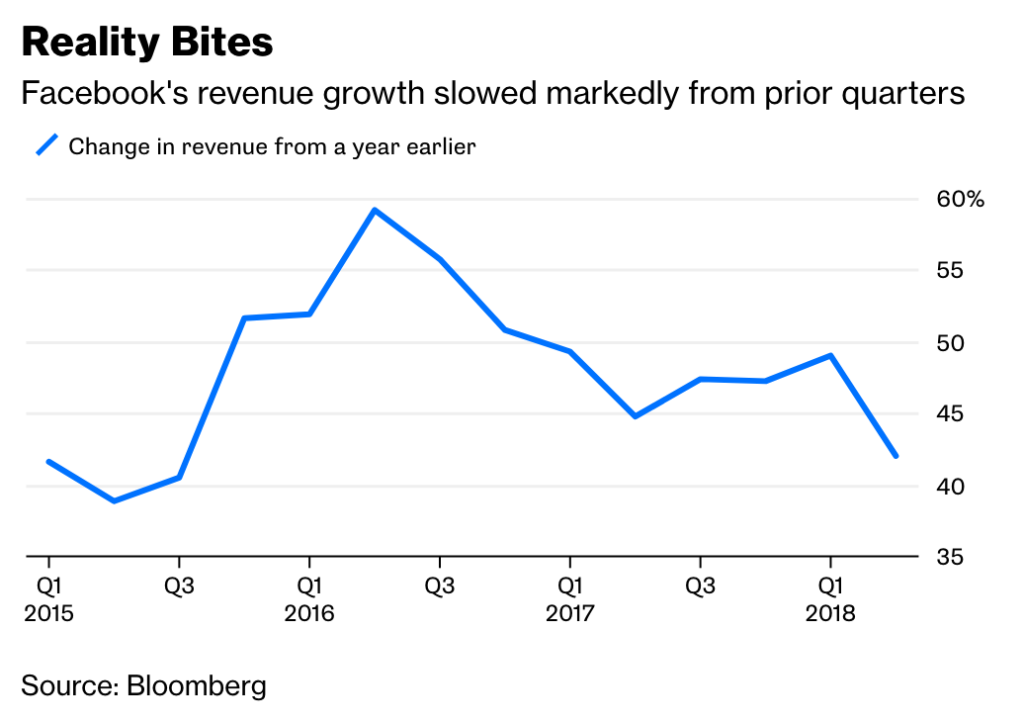Category Archives: Facebook
Could reality be catching up with Facebook?
This — from Bloomberg — is interesting:
Facebook Inc. hasn’t been able to do anything right — except when it comes to making money, where it could do nothing wrong.
That changed on Wednesday, when the company posted disappointing growth in revenue, profits and the number of visitors to its digital hangouts. Results are still stellar by the standards of most companies, but investors in fast-growing technology companies react badly when their high hopes aren’t met, as Netflix recently found out. Facebook hit a record stock price on Wednesday, but after the release of its financial results, its shares dropped a stunning 24 percent in after-hours trading.
And no wonder. The company’s financial results, and especially its glimpse into a more pessimistic financial future, were utter disaster for investors. If what the company predicts comes to pass, the internet’s best combination of fast revenue growth and plump profit margins is dead. All at once, it seemed, reality finally caught up to Facebook.
Well, among other things (including plans for its very own earth-orbiting satellites), those 20,000+ content ‘moderators’ have to be paid for somehow.
So what’s the problem with Facebook?
Interesting NYT piece by Kevin Roose in which he points out that the key question about regulating Facebook is not that lawmakers know very little about how it works, but whether they have the political will to regulate it. My hunch is that they don’t, but if they did then the first thing to do would be fix on some clear ideas about what’s wrong with the company.
Here’s the list of possibilities cited by Roose:
- Is it that Facebook is too cavalier about sharing user data with outside organizations?
- Is it that Facebook collects too much data about users in the first place?
- Is it that Facebook is promoting addictive messaging products to children?
- Is it that Facebook’s news feed is polarizing society, pushing people to ideological fringes?
- Is it that Facebook is too easy for political operatives to exploit, or that it does not do enough to keep false news and hate speech off users’ feeds?
- Is it that Facebook is simply too big, or a monopoly that needs to be broken up?
How about: all of the above?
Google, Facebook and the power to nudge users
This morning’s Observer column:
Thaler and Sunstein describe their philosophy as “libertarian paternalism”. What it involves is a design approach known as “choice architecture” and in particular controlling the default settings at any point where a person has to make a decision.
Funnily enough, this is something that the tech industry has known for decades. In the mid-1990s, for example, Microsoft – which had belatedly realised the significance of the web – set out to destroy Netscape, the first company to create a proper web browser. Microsoft did this by installing its own browser – Internet Explorer – on every copy of the Windows operating system. Users were free to install Netscape, of course, but Microsoft relied on the fact that very few people ever change default settings. For this abuse of its monopoly power, Microsoft was landed with an antitrust suit that nearly resulted in its breakup. But it did succeed in destroying Netscape.
When the EU introduced its General Data Protection Regulation (GDPR) – which seeks to give internet users significant control over uses of their personal data – many of us wondered how data-vampires like Google and Facebook would deal with the implicit threat to their core businesses. Now that the regulation is in force, we’re beginning to find out: they’re using choice architecture to make it as difficult as possible for users to do what is best for them while making it easy to do what is good for the companies.
We know this courtesy of a very useful 43-page report just out from the Norwegian Consumer Council, an organisation funded by the Norwegian government…
Implications of Facebook’s changed newsfeed curation algorithms
Interesting piece in *Slate about the impact of news publishers of Facebook’s new-found desire to escape from news.
Slate — yes, the publication you’re reading right now — got more than 85 million clicks that originated from external sites and apps in January 2017 alone. Almost a third of them — 28 million—came from Facebook. That was more than any other single outside traffic source. Other online publications with a political focus, such as Vox and Politico, posted similarly blockbuster numbers.
It was, in retrospect, the zenith of Facebook’s influence over the news industry. Starting in about 2013, when the social network began prioritizing actual news in users’ news feed rankings—the order in which posts appear when you scroll through its app or site—Facebook had grown increasingly critical to many media outlets’ business, for better or worse. Every visitor the social network sent to an outlet’s pages translated to much-needed ad views. And it sent so many that newsrooms remolded their editorial strategies to maximize clicks, likes, and shares on Facebook. For less scrupulous publishers, that sometimes meant sensationalizing headlines or framing stories in ways that pandered to people’s biases—a trend that Facebook tried to combat algorithmically, with limited success. By August 2016, the New York Timess’ John Herrman wrote that Facebook had “centralized online news consumption in an unprecedented way,” shaping how the public perceived politics by determining which stories they’d see in their feeds. And by 2017, some antitrust thinkers concerned with its centrality to the news business were calling for Facebook to be regulated as a monopoly.
Zuckerberg’s monster
My Observer review of Siva Vaidhyanathan’s Anti-social Media: How Facebook Disconnects Us and Undermines Democracy:
The best metaphor for Facebook is the monster created by Dr Frankenstein. Mary Shelley’s story shows how, as Fiona Sampson put it in a recent Guardian article, “aspiration and progress are indistinguishable from hubris – until something goes wrong, when suddenly we see all too clearly what was reasonable endeavour and what overreaching”. There are clear echoes of this in the evolution of Facebook. “It’s a story”, writes Siva Vaidhyanathan in this excellent critique, “of the hubris of good intentions, a missionary spirit and an ideology that sees computer code as the universal solvent for all human problems. And it’s an indictment of how social media has fostered the deterioration of democratic and intellectual culture around the world.”
Facebook was founded by an undergraduate with good intentions but little understanding of human nature. He thought that by creating a machine for “connecting” people he might do some good for the world while also making himself some money. He wound up creating a corporate monster that is failing spectacularly at the former but succeeding brilliantly at the latter. Facebook is undermining democracy at the same time as it is making Mark Zuckerberg richer than Croesus. And it is now clear that this monster, like Dr Frankenstein’s, is beyond its creator’s control…
Facebook and the CCTV effect
This morning’s Observer column:
Jeremy Paxman, who once served as Newsnight’s answer to the pit-bull terrier, famously outlined his philosophy in interviewing prominent politicians thus: “Why is this lying bastard lying to me?” This was unduly prescriptive: not all of Paxman’s interviewees were outright liars; they were merely practitioners of the art of being “economical with the truth”, but it served as a useful heuristic for a busy interviewer.
Maybe the time has come to apply the same heuristic to Facebook’s public statements…
Why is WhatsApp founder quitting Facebook? You can guess the answer
This morning’s Observer column:
Early in 2009, two former Yahoo employees, Brian Acton and Jan Koum, sat down to try and create a smartphone messaging app. They had a few simple design principles. One was that it should be easy to use: no complicated log-in and authentication procedures; instead, each user would be identified by his or her mobile number. And second, the app should have an honest business model – no more pretending it’s free while covertly monetising users’ data: instead, users would pay $1 a year after a certain period. Searching for a name for their service, they came up with WhatsApp, a play on “What’s Up?”
Zuckerberg for Pope?
Roger McNamee, an early Facebook investor who has been sounding the alarm about the social media giant since the run-up to the 2016 presidential election, is not letting up.
In an interview with the Mercury News, McNamee talked about why he thinks Facebook should be reined in — and possibly broken up.
“It is no exaggeration to say that the AT&T consent decree planted the seed for Silicon Valley,” McNamee wrote. “One of the many fundamental patents in AT&T’s huge portfolio was the transistor. The combination of freely licensable patents and restrictions on AT&T’s ability to enter new markets enabled entrepreneurs to create today’s semiconductor, computer, data communications, mobile technology and software industries, among others.”
McNamee told this news organization that the changes Facebook is making now don’t go far enough, and that “nobody can make them” enact change that would truly address the myriad problems with the platform, including possible manipulation of Facebook’s massive number of users.
“There are 2.2 billion people on Facebook each with their own ‘Truman Show,’ ” McNamee said. “Everybody has their own set of facts.”
In addition, he takes issue with the attitudes of Facebook’s top executives.
Facebook is “almost the same size as Christianity,” McNamee said. “When you are presiding over the largest interconnected organization in the world, that gets to your head after a while.”
Zuckerberg for Pope?
Facebook: stay tuned for more disclosures
That’s the message they’re giving to investors.
“We anticipate that our ongoing investments in safety, security, and content review will identify additional instances of misuse of user data or other undesirable activity by third parties on our platform.”
Well, well. Maybe Cambridge-Analytica is just the thin end of an interesting wedge.


